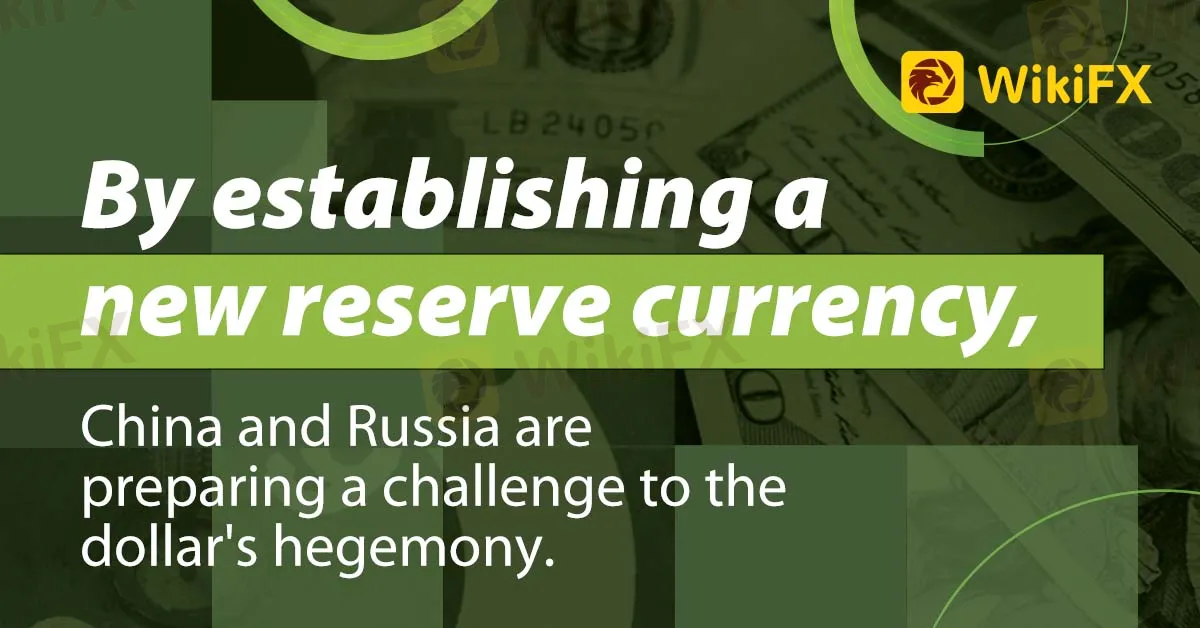简体中文
繁體中文
English
Pусский
日本語
ภาษาไทย
Tiếng Việt
Bahasa Indonesia
Español
हिन्दी
Filippiiniläinen
Français
Deutsch
Português
Türkçe
한국어
العربية
By establishing a new reserve currency, China and Russia are preparing a challenge to the hegemony
Abstract:Along with China and the other BRICS countries, Russia is prepared to create a new global reserve currency that may potentially threaten the supremacy of the US dollar.

Along with China and the other BRICS countries, Russia is prepared to create a new global reserve currency that may potentially threaten the supremacy of the US dollar.
The new reserve currency, which would be based on a basket of the currencies of the group's members Brazil, Russia, India, China, and South Africa, was hinted to by President Vladimir Putin.
Putin stated at the BRICS Business Forum on Wednesday that “the issue of developing the international reserve currency based on the basket of currencies of our nations is under discussion.” “We are prepared to work honestly with any ethical partners.”
Although the dollar has long been considered the world's reserve currency, its supremacy in terms of the proportion of global currency reserves is dwindling. According to the International Monetary Fund, central banks are attempting to diversify their holdings by including both conventional assets like the Swedish krona and the South Korean won as well as non-traditional ones like the yuan.
The IMF's perceived US predominance is being addressed, according to ING's global head of markets Chris Turner, who stated as much in a note. It will enable the BRICS to create their own economic system and currency inside that system.
Following Western sanctions over the Ukraine war that effectively locked the nation out of the global financial system and restricted access to its money, Russia made this action.
According to ING's Turner, the speed with which Western countries and their allies sanctioned Russia's foreign exchange holdings (freezing around half) “no doubt astonished Russian officials.”
He said, The Central Bank of Russia essentially acknowledged as much, and no doubt certain BRICS nations — particularly China — took notice of the speed and covertness with which the US Treasury moved.
According to Turner, the restrictions have probably prompted Beijing and Moscow to develop a substitute for the special drawing rights, the IMF's international reserve asset.
The SDR is based on a basket of currencies that includes the US dollar, the euro, the British pound, the Japanese yen, and China's yuan, albeit it is not a reserve currency.
He indicated that one option is that the BRICS basket currency may draw reserves from nations that are currently within their sphere of influence in addition to the group's members. These include states in the Middle East and South Asia.
Thanks to assistance from the central bank, Russia's currency, the ruble, has recovered to levels above those of the pre-war period after falling by 70% in less than two weeks following the invasion of Ukraine. To 1.87 cents, it has increased 15.2 percent in June. In the meanwhile, the yuan has remained stable over the same

Disclaimer:
The views in this article only represent the author's personal views, and do not constitute investment advice on this platform. This platform does not guarantee the accuracy, completeness and timeliness of the information in the article, and will not be liable for any loss caused by the use of or reliance on the information in the article.
Read more

Bitpanda Secures Full Broker-Dealer License in Dubai
Bitpanda has officially obtained a full broker-dealer license from the Dubai Virtual Assets Regulatory Authority (VARA), marking a significant milestone in its international expansion. This approval, which follows preliminary authorization granted three months earlier, enables the European digital asset exchange to introduce its comprehensive suite of virtual asset services to investors in the United Arab Emirates (UAE).

Gold Surges to New Highs – Is It Time to Buy?
Recently, gold prices have once again set new records, surpassing $3,077 per ounce and continuing a four-week winning streak. Is It the Right Time to Invest?

Why Does the Yen's Exchange Rate Fluctuate Repeatedly?
JPY Exchange Rate Fluctuations: How Should Investors Respond?

Hantec Markets Launches InsightPro: AI-Powered Real-Time Trading Signal Tool for Traders
Hantec Markets introduces InsightPro, an AI-powered trading tool offering real-time market insights, signals, and analysis for better trading success.
WikiFX Broker
Latest News
Enlighten Securities Penalized $5 Million as SFC Uncovers Risk Control Failures
Why Are Financial Firms Adopting Stablecoins to Enhance Services and Stability?
Experienced Forex Traders Usually Do This Before Making a Lot of Money
Octa vs XM:Face-Off: A Detailed Comparison
When High Returns Go Wrong: How a Finance Manager Lost RM364,000
Bridging Trust, Exploring Best—WikiEXPO Hong Kong 2025 Wraps Up Spectacularly
Interactive Brokers Expands Crypto Trading with Solana, XRP, Cardano, and Dogecoin
Fidelity Investments Explores Stablecoin Innovation in Digital Assets Sector
Why More People Are Trading Online Today?
SEC Ends Crypto.com Probe, No Action Taken by Regulator
Currency Calculator







